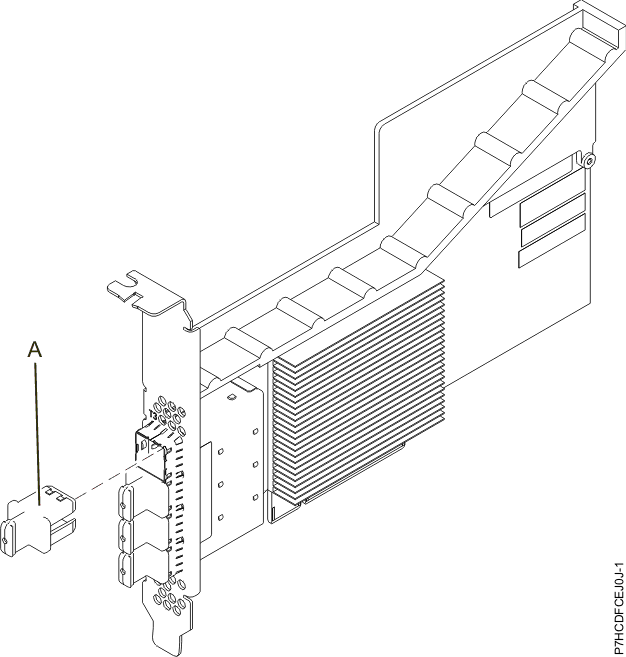PCIe3 RAID SAS quad-port 6 Gb Adapter (FC EJ0J; CCIN 57B4)
Learn about the specifications and operating system requirements for the feature code (FC) EJ0J adapter.
Overview
The PCIe3 RAID SAS quad-port 6 Gb Adapter is a PCI Express (PCIe), generation 3, RAID SAS adapter that has a low-profile, short-form factor, but packaged for full height installation. The adapter is used in high-performance and high-density, serial attached SCSI (SAS) applications. It supports the attachment of SAS disk and SAS tape by using four mini SAS high-density (HD) x4 connectors that allow the physical links to be used in various narrow and wide-port configurations. SAS tape attachment is only supported in a single adapter configuration and cannot be mixed with SAS disk on the same adapter. The adapter does not have write cache. Figure 1 shows the PCIe3 RAID SAS quad-port 6 Gb Adapter.
The adapter is a 64 bit, 3.3 V, bootable SAS adapter that provides RAID 0, 5, 6, 10, 5T2, 6T2, and 10T2 capability, and system level mirroring via the operating system. The adapter provides both single and dual RAID controller configurations. Dual controller configurations (dual storage IOA) must run RAID. JBOD (512 byte) functionality is supported only in a single controller configuration based on the operating system. Best performance is achieved when multiple RAID sets are configured and optimized under a pair of adapters in a high availability, multi-initiator RAID configuration (dual storage IOA) which allows for an Active-Active mode of operation.
Figure 1 shows the adapter. The connector plug (A) is installed in an empty port and prevents damage to that port whenever a cable for the adjacent port connectors is plugged-in or removed.

Specifications
- Item
- Description
- Adapter FRU number
- 000FX846 (Designed to comply with RoHS requirement)
- Connector plug part number
- 00FW784 (The connector plug is installed in an empty port and prevents damage to that port whenever a cable for the adjacent port connectors is plugged-in or removed.)
- I/O bus architecture
- PCIe 3.0 but compatible to PCIe 2.0 or PCIe 1.0 slots.
- Slot requirement
- One available PCIe x8 slot per adapter.
- Cables
- Specific X, YO, AA, or AT SAS cable features with new narrow HD connectors are used to attach to the other adapter or disk expansion drawers.
- SAS device attachment requires specific cables that are provided with the subsystem or device features that are being attached. Special cabling is required for multi-initiator and high availability configurations. Specific AE1 or YE1 SAS cable features are required for SAS Tape attachment. See Serial attached SCSI cable planning.
- Voltage
- 3.3 V
- Form factor
- Short, low-profile but packaged for full-height installations.
- Maximum number
- For the maximum adapters supported, see the PCI adapter placement topic collection for your system.
- Attributes
- Four external mini SAS HD 4x connectors provide attachment of SAS device enclosures
- SAS Serial SCSI Protocol (SSP) and Serial Management Protocol (SMP)
- RAID 0, 5, 6, or 10 with hot-spare capability. System level mirroring through the operating system is also supported. JBOD functionality (512 byte) is supported in a single controller configuration only.
- Concurrent firmware update
- Removable media device (SAS Tape) are supported in a single controller configuration only and cannot be combined with disk devices attached to the same adapter. Removable media is not supported in multi-initiator and high availability (dual storage IOA) configurations
- Support for multi-initiator and high availability or single controller configurations
Operating system or partition requirements
If you are installing a new feature, ensure that you have the software that is required to support the new feature and that you determine whether any prerequisites must be met for this feature and attaching devices. To check for the prerequisites, see IBM Prerequisite website.
- AIX
- AIX 7.1, or later
- AIX Version 6.1, or later
- Linux
- Red Hat Enterprise Linux Version 6.4, or later, with current maintenance updates available from Red Hat.
- SUSE Linux Enterprise Server 11, Service Pack 3, or later, with current maintenance updates available from SUSE.
- The latest version of the device driver or iprutils can be downloaded from the IBM Service and Productivity Tools website.
- IBM i
- IBM i Version 7.2 or later
- IBM i Version 7.1, or later
- Supported on Firmware level 7.8, or later.
- AIX: devices.pciex.14104a03.device driver package
Other important requirements for adapter installation
- If you are attaching a new or existing FC 5887 to an FC EJ0J adapter, verify that the latest System Enclosure Services (SES) code is applied to the FC 5887 before attaching to the FC EJ0J adapter, see the IBM Prerequisites website.
- If you are migrating existing SAS disk enclosures and devices from existing previous PCIe SAS adapters to PCIe2 or PCIe3 SAS adapters, an automatic sector conversion takes place for use with the new adapters. For information about the migrating procedures, see Upgrading the adapter in the POWER7® IBM Knowledge Center.
